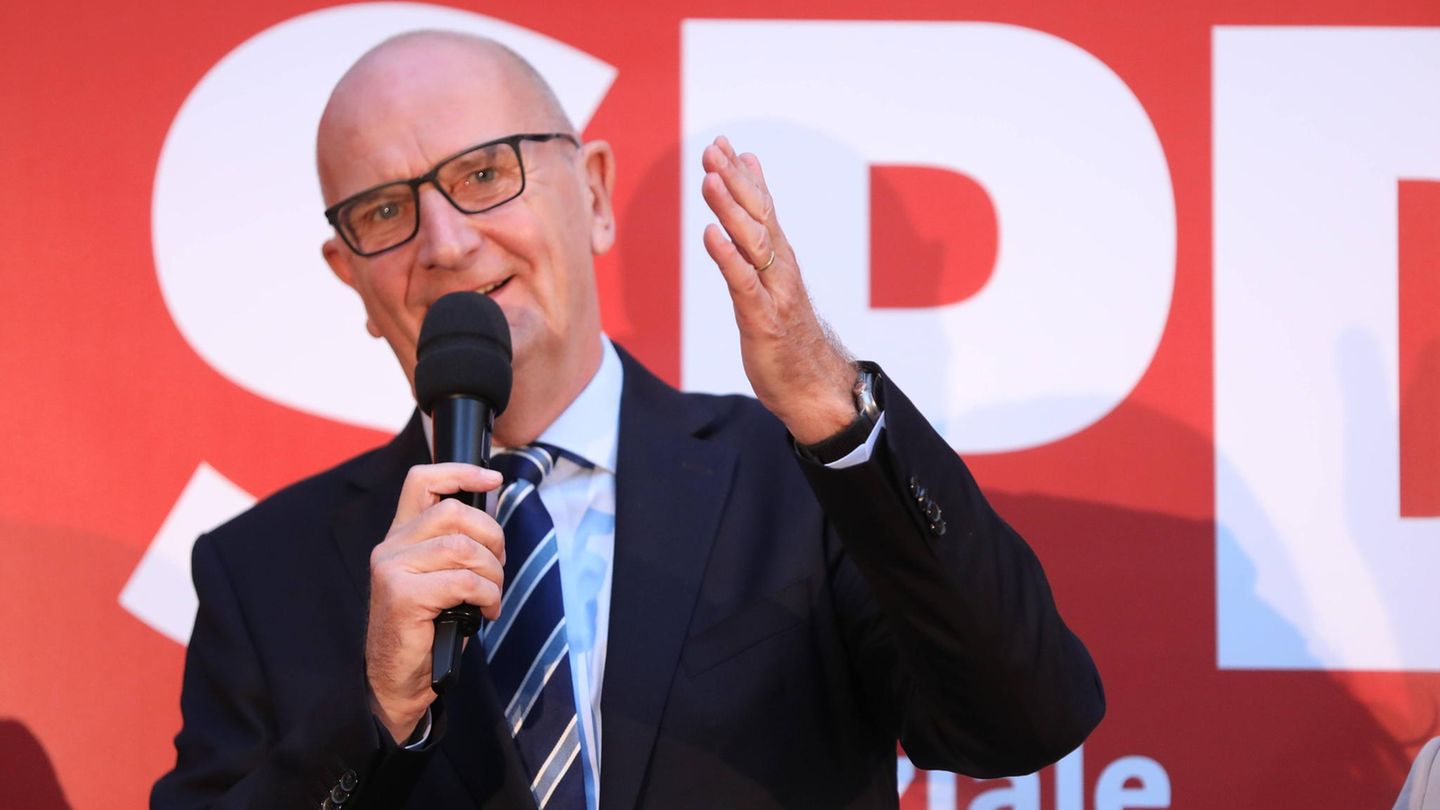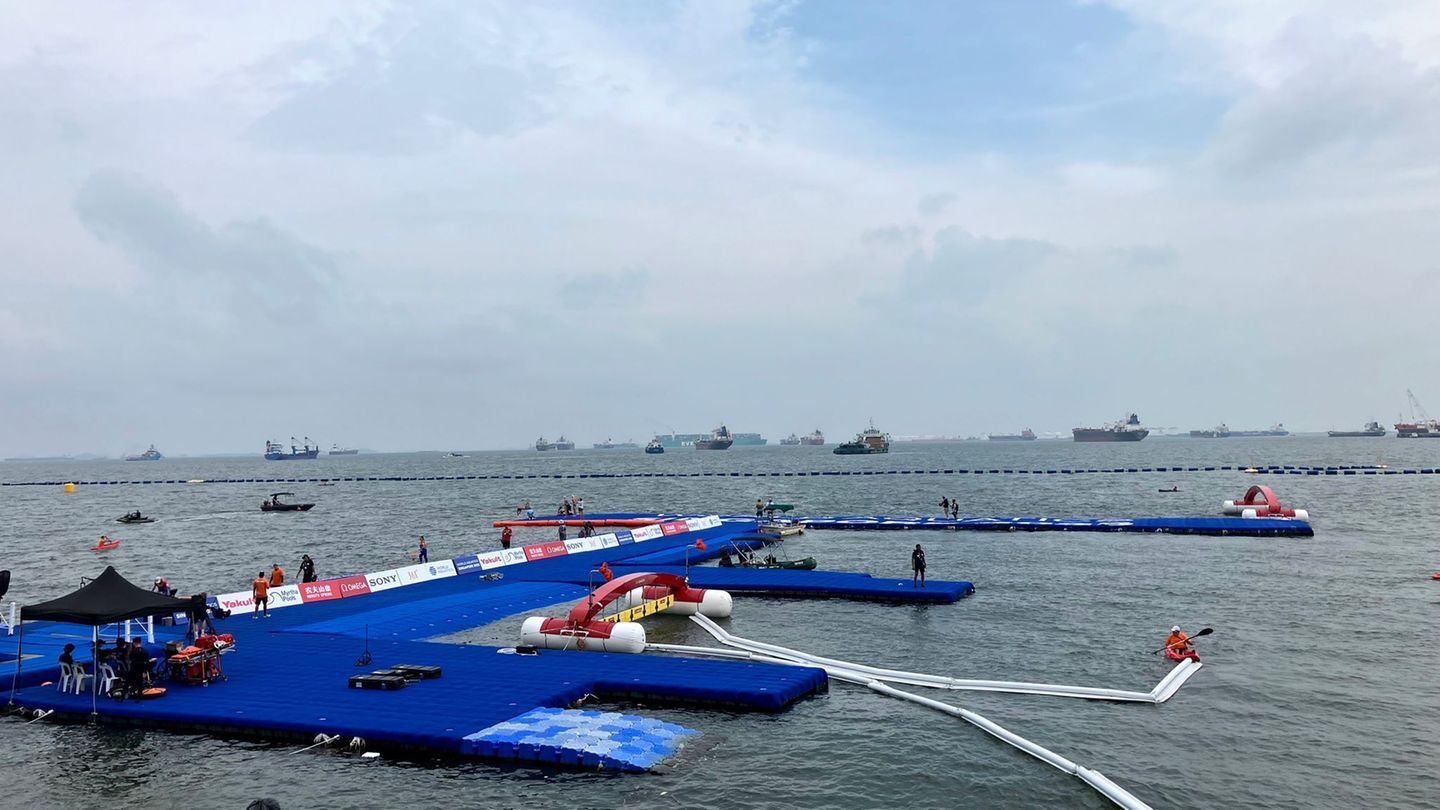Woidke or AfD: By making his office dependent on a victory, the Brandenburg head of government managed to push his Social Democrats into first place once again. The quick analysis.
Woidke’s risky bet pays off
One had almost forgotten: This is what victorious Social Democrats look like. At 6:15 p.m., Dietmar Woidke is standing in the courtyard of the so-called “Gaumenarche”, just 300 meters from the Potsdam State Parliament, and is being celebrated. He is almost 63 years old and has been Prime Minister of Brandenburg for eleven years: if the initial projections are confirmed, he will be allowed to stay in the State Chancellery for another five years. “It was a lot of hard work!” he exclaims. The figures are not yet completely reliable. But it looks like “as so often in history, it was Social Democrats who stopped extremists on their way to power.”
It is Woidke’s victory, completely and utterly. In the summer he made a risky bet: He not only relied on the old me-or-the-AfD incumbency bonus, which had already worked for his East German CDU colleagues Michael Kretschmer and Reiner Haseloff or fellow Social Democrat Manuela Schwesig. No, this time he went one step further: If he did not come in first place, he would make his government office available, he threatened. Then someone else would have to govern the country.
The announcement worked. Week after week, the SPD moved closer to the AfD, which had been ahead by as much as ten percentage points in polls over a year and a half. It proved helpful that Woidke effectively banned Scholz, who lives in Brandenburg, from the election campaign. The Chancellor was not allowed to disrupt the Woidke show.
Election graphic Brandenburg 2024
A breather for Scholz – but nothing more
It was damn close, but it was a close call: In the Willy Brandt House, the SPD’s Berlin party headquarters, there is probably great relief – once again. The state election in Brandenburg was also a “fateful election” for the SPD, as are all elections for the struggling Social Democrats.
This puts a bitter aftertaste on the remarkable comeback of SPD Prime Minister Woidke, who, according to initial projections, came in just short of first place with 31 to 32 percent (2019: 26.2 percent).
If nothing fundamentally changes in the numbers, then the red stronghold of Brandenburg will remain in social democratic hands, with the SPD the strongest force (since 1990). This should at least give the unpopular Chancellor Olaf Scholz a breather from the constant murmuring of his comrades about whether he can still lead the SPD as chancellor (candidate) into the next federal election.
On the one hand. On the other hand, the (presumed) victory in Brandenburg does not make us forget the poor results in Saxony and Thuringia, where the SPD was reduced to a meager single-digit result, and the historic negative result in the European elections. The pressure on Scholz from his party to go more on the offensive and push through SPD Pur is likely to remain high.
The traffic light crisis is getting bigger: What are the Greens and FDP doing?
Things are not going well, not at all. In Brandenburg, too, the Greens have been the ones to suffer, having practically halved their 2019 result (10.8 percent). Depending on the forecast, even their return to parliament is in jeopardy.
This is not a good starting point for Vice Chancellor Robert Habeck, the Greens’ likely candidate for chancellor. They already missed out on re-election in Thuringia, and they also lost ground in Saxony. The Greens’ reputation is pretty tarnished, at least in East Germany. Is a clear mandate for a candidacy for chancellor still worth it? Perhaps now more than ever, the pragmatist Habeck could fundamentally change his party’s finger-pointing image.
STERN PAID 35_24 IV Woidke 16.24
For the FDP, on the other hand, there was not much to lose in Brandenburg, as the Liberals already missed out on entering the state parliament in 2019. This time, however, the apparently very weak result is no longer even reported separately, but is included under “Other”. In any case, the results of the Greens and FDP are not a stabilizing measure for the stumbling Berlin traffic light coalition. Both parties are now likely to look for areas to raise their profile and pay less attention to their coalition partners – which in all likelihood means even more unrest in the government, which is already characterized by a tendency to quarrel.
The AfD’s strategy: the stronger, the more radical – and vice versa
It was apparently not enough for the AfD to take first place. But it has grown significantly. In rural areas, but also in peripheral towns like Cottbus, it is clearly the strongest force. This means that, similar to what happened previously in Saxony and especially in Thuringia, the state party’s escalation strategy has worked. The entire AfD is likely to copy it in the federal election campaign.
Brandenburg had already become a center of right-wing extremists in the AfD under Andreas Kalbitz. This has not changed under the leading candidate Hans-Christoph Bernd and his regional leader René Springer. Their appearance may seem more authoritative than that of Kalbitz or Björn Höcke, but ideologically they are just as nationalistic and radical as them. The Brandenburg AfD openly calls for the remigration of millions of foreigners, wants to privatize deportations and exclude refugees from public events.
Extreme positions, coupled with a professional demeanor: Springer in particular has perfected this combination. With the network of young politicians he has orchestrated, he will help shape the federal election campaign. This means that the AfD’s principle of success remains the same: the stronger, the more radical – and vice versa.
Hans-Christoph Berndt Portrait 08.51
CDU disappointed: But Merz can no longer be denied the candidacy for chancellor
The Christian Democrats have to cope with a bitter defeat: Only 11.8 percent voted for the CDU, even fewer than in the last state election (15.6 percent). Just two months ago, leading candidate Jan Redmann was neck and neck with incumbent Woidke at 19 percent of the polls – not even Redmann’s drunk driving could change that. But Woidke’s all-or-nothing strategy, which turned the party-political battle into a two-way battle, did. The CDU was left behind. Now they are neck and neck with the newly founded Wagenknecht party for third or fourth place. Ouch.
For Friedrich Merz, the Union’s designated candidate for chancellor, who wants to be officially chosen by the party executive on Monday, this is a very bad start. He has to comment on the defeat, explain it, and classify it – even if the result has little to do with him and his candidacy.
He is likely to face uncomfortable questions. For example, how he would feel about a coalition with the BSW in Brandenburg. If the Greens do not actually enter the state parliament, as the forecasts suggest, it could end up being a coalition government made up of the SPD, CDU and BSW. Merz recently said that he considered an alliance with the Wagenknecht party in Thuringia or Saxony to be “very, very, very unlikely”.
Why Wagenknecht has to be careful
For Sahra Wagenknecht and her party, the preliminary result is satisfactory at best. The 12 percent forecast for the BSW is between the results in Saxony (11.8 percent) and Thuringia (15.8 percent).
However, the BSW in Brandenburg is structurally weaker than in the other two states, with fewer members and a single visible leader. In addition, top candidate Robert Crumbach, unlike the front women in Saxony and Thuringia, was a career changer with no previous political experience.
Brandenburg could now be the third state in which the BSW is needed to govern – and in which Wagenknecht will try to dictate the conditions. The more her party is forced into responsibility, the less the radical populist course in Berlin will work. Either way, Wagenknecht has further damaged her former party: after the Left Party was badly ruffled in Thuringia and only managed to get into the state parliament in Saxony via direct mandates, it is now unlikely to be represented at all in the Brandenburg parliament.
Source: Stern
I have been working in the news industry for over 6 years, first as a reporter and now as an editor. I have covered politics extensively, and my work has appeared in major newspapers and online news outlets around the world. In addition to my writing, I also contribute regularly to 24 Hours World.




